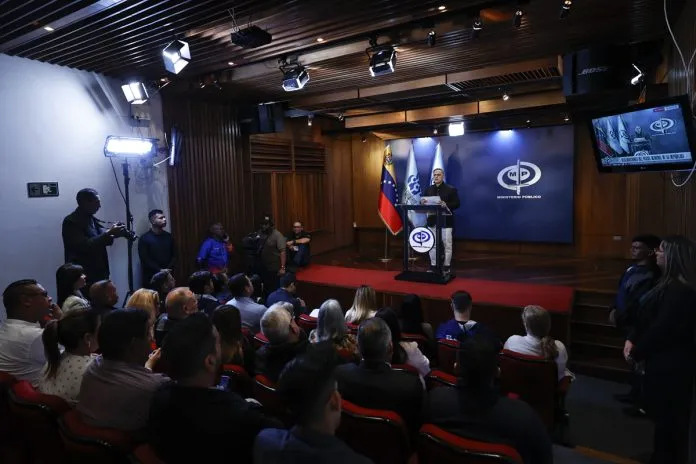Introduction
In a dramatic development following Venezuela’s recent presidential election, Attorney General Tarek William Saab has made serious allegations against prominent opposition figures María Corina Machado, Leopoldo López, and Lester Toledo. Saab claims these individuals were involved in a sophisticated cyberattack aimed at Venezuela’s National Electoral Council (CNE). This report provides an in-depth analysis of the accusations, the alleged cyberattack, and the broader implications for Venezuela’s electoral process.
Allegations and Accusations
Overview of the Allegations
Attorney General Tarek William Saab has accused María Corina Machado, Leopoldo López, and Lester Toledo of orchestrating a cyberattack against the CNE’s electoral system. According to Saab, the attack originated from North Macedonia and was intended to manipulate the data being received by the CNE. The allegations paint a picture of a coordinated effort to undermine the integrity of Venezuela’s electoral process.
Details of the Alleged Attack
Origin and Intent
Saab reported that the cyberattack was conducted from North Macedonia, a detail that underscores the complexity and international reach of the alleged operation. The primary goal, as described by Saab, was to interfere with the data transmission processes of the CNE, thereby influencing the reported election results.
Impact on the Election Process
The attack reportedly caused significant delays in the electoral process. Saab stated that while the attempt to manipulate the results was unsuccessful, it nonetheless hindered the timely announcement of the election results. The alleged intent was to falsify election documents, thereby affecting the integrity of the reported outcomes.
Involvement of Key Figures
Lester Toledo
Saab specifically identified Lester Toledo as the principal figure behind the alleged cyberattack. Toledo, who is currently residing abroad and is considered a fugitive from Venezuelan justice, is accused of masterminding the operation. Saab’s statements suggest that Toledo’s involvement is central to the investigation, reflecting the seriousness of the charges against him.
María Corina Machado and Leopoldo López
In addition to Toledo, María Corina Machado and Leopoldo López have been implicated in the allegations. Both are prominent opposition leaders who have been vocal critics of the current Venezuelan government. The accusations against them add a political dimension to the investigation, highlighting the tense and polarized nature of Venezuela’s political landscape.
Official Responses and Reactions
CNE’s Request for Investigation
In response to the allegations, the CNE has formally requested an investigation into the alleged cyberattack. The CNE’s President, Elvis Amoroso, called for immediate action by the Public Ministry to address what he described as “terrorist actions” against the electoral system. The CNE’s statement emphasized the need to investigate attacks not only on the data transmission system but also on voting centers and electoral officials.
Statements from the CNE
Elvis Amoroso has underscored the severity of the situation, noting that the attack disrupted the announcement of the initial official results. The CNE has sought to reassure the public that despite the disruptions, the integrity of the electoral process is being safeguarded. Amoroso’s comments reflect the ongoing concern about the impact of these allegations on public trust in the electoral system.
Historical Context and Previous Issues
Past Electoral Disputes
The current allegations are part of a broader history of disputes surrounding Venezuela’s electoral processes. Previous elections have faced similar controversies, often involving accusations of fraud and manipulation. The current allegations echo past claims, highlighting ongoing tensions between the government and opposition.
Opposition Primaries in October
Saab referenced a previous incident involving the opposition’s primaries held in October. These primaries, which were conducted without the involvement of the electoral authority, faced criticism for their lack of verification mechanisms and auditability. The discrepancy between reported and actual participation numbers further fueled concerns about electoral integrity.
Broader Implications
Impact on Venezuelan Politics
The allegations against Machado, López, and Toledo have significant implications for Venezuelan politics. If proven true, the cyberattack could exacerbate existing political tensions and further polarize the country. The involvement of high-profile opposition figures adds complexity to the situation, potentially influencing the dynamics of Venezuela’s political landscape.
International Reactions
The international community’s response to the allegations will be crucial. If verified, the cyberattack could prompt calls for greater scrutiny of Venezuela’s electoral processes and international involvement in addressing electoral integrity concerns. The international reaction will likely influence Venezuela’s diplomatic relations and the global perception of its political stability.
Conclusion
The accusations of a cyberattack against Venezuela’s National Electoral Council by key opposition figures represent a significant development in the country’s ongoing political crisis. Attorney General Tarek William Saab’s allegations highlight the complex and contentious nature of Venezuela’s electoral environment. As investigations proceed, the impact of these allegations on Venezuela’s political stability, public trust, and international relations will be closely watched.


